
24 January, 2024
Expert Tips on Glassware Maintenance: A Comprehensive Guide
Glassware is integral to any kitchen, bar, or dining setting. From water glasses to wine goblets, each piece serves a specific purpose and often contributes to the aesthetic appeal of your table. However, glassware requires a certain level of care to maintain its clarity, brilliance, and structural integrity. This has many parts depending on the type of glassware, so we thought we'd compile a comprehensive list of the dos and don'ts.
Understanding Types of Glassware: An Expanded Guide
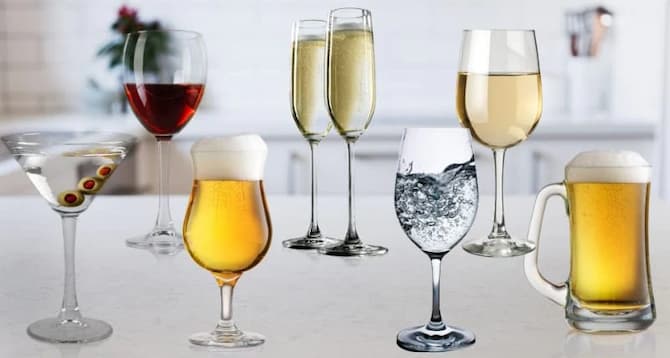
When it comes to glassware, not all pieces are created equal. The material, design, and purpose of each piece can vary, which means the approach to maintenance must be tailored accordingly. Below is an expanded discussion on the types of glassware you may encounter and the particularities of each.
1) Borosilicate Glass
Characteristics: Known for its resistance to thermal shock, borosilicate glass is often used in laboratory equipment and certain types of cookware.
Maintenance: Dishwasher safe and can tolerate temperature changes better than other types of glass. However, it's still advisable to avoid sudden temperature fluctuations.
2) Soda-Lime Glass
Characteristics: This is the most common type of glass and is often used for water jugs, jars, and other everyday items.
Maintenance: While typically dishwasher safe, it is more susceptible to thermal shock compared to borosilicate glass. Handle with care when transferring from hot to cold environments.
3) Lead Crystal
Characteristics: Valued for its brilliance and clarity, lead crystal glassware is often used for special occasions and luxurious settings.
Maintenance: Very delicate and should be hand-washed with a soft sponge and gentle detergent. Immediate drying is advisable to maintain its sparkle.
4) Non-Lead Crystal
Characteristics: Similar to lead crystal but without the lead content, making it somewhat more durable.
Maintenance: While still delicate, it's typically more dishwasher-friendly than its leaded counterpart. However, hand washing is often recommended to prolong lifespan.
5) Tempered Glass
Characteristics: Strengthened through a thermal or chemical process, tempered glass is more durable and less prone to breaking.
Maintenance: Dishwasher safe and fairly resistant to thermal shock, but avoid using abrasive materials for cleaning, which could scratch and weaken the surface.
6) Art Glass
Characteristics: Often colourful and intricate, art glass is usually handcrafted and used more for decoration than functionality.
Maintenance: Because each piece is unique, follow any artisan or manufacturer guidelines for cleaning. Typically, hand washing is safest.
7) Antique or Heirloom Glass
Characteristics: Passed down through generations or acquired as collectibles, these pieces can be delicate due to age and wear.
Maintenance: Often requires special attention, including gentle hand washing and occasional professional restoration.
8) Hand-Blown Glass
Characteristics: Hand-crafted and often unique in shape and colour. Generally used for more artistic or luxurious settings.
Maintenance: Because of their delicate nature, hand-blown glass pieces are best washed by hand using soft materials.
Understanding the different types of glassware you own or intend to purchase is essential for their proper maintenance. Tailoring your cleaning and storage methods to the specific type of glass will ensure your glassware remains in top condition for years to come.
The Basics
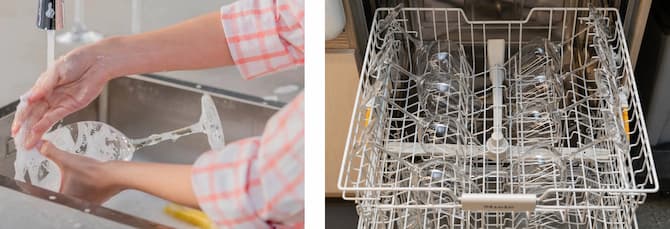
When it comes to glassware, proper cleaning is crucial for aesthetics and maintaining the integrity of the glass. Below, we delve into the nitty-gritty of cleaning fundamentals—covering methods, rinsing practices, and drying techniques to ensure your glassware retains its original charm.
Hand Washing vs. Dishwashing: The Great Debate
1) Hand Washing
- Advantages: Hand washing is often considered the safest route, particularly for delicate, antique, or hand-blown glassware that may be more susceptible to damage. This method gives you complete control over the pressure and movement, reducing the risk of accidental chipping or breaking.
- Process: Fill a basin with warm water and add a few drops of mild detergent. Using a soft sponge or cloth, gently wash the glassware, reaching into corners and under the rim. Avoid scrubbing too hard, as this can cause scratches.
- Best For: This method is ideal for delicate pieces like crystal wine glasses, hand-blown art pieces, and antiques with intricate designs.
2) Dishwashing
- Advantages: Dishwashing offers the advantage of convenience and is suitable for sturdy, everyday glassware. A gentle cycle can handle large batches of items, saving time and effort.
- Process: Before opting for this method, always check the manufacturer's guidelines to ensure the glassware is dishwasher-safe. Use a gentle dishwasher cycle, and ensure that items are spaced adequately to prevent them from clinking together, which can cause breakage.
- Best For: Everyday glassware made from tempered or soda-lime glass is usually suitable for this method. Borosilicate glass cookware can often also be safely dishwashed.
3) Rinsing and Drying: Finish Strong
Rinsing
- Importance: Proper rinsing is imperative to remove any lingering soap residue, making the glass look dull and cloudy over time.
- Process: Rinse thoroughly under warm running water. Consider a final rinse with distilled water for extra-sensitive pieces to prevent mineral spots.
- Best For: All types of glassware benefit from thorough rinsing. Those prone to clouding, like lead crystal, particularly need this attention.
Drying
- Importance: Drying is just as crucial as washing and rinsing. Air drying can leave water spots or streaks, detracting from the glass's clarity and shine.
- Process: Using a lint-free cloth or a microfibre towel, gently pat the glass dry or wipe in a circular motion to prevent streaks. Consider using a soft-bristled brush for detailed drying for pieces with crevices or intricate designs.
- Best For: Delicate or high-quality pieces like crystal should be hand-dried to maintain lustre. Everyday glassware can be air-dried if not prone to spotting, but will look better if dried by hand.
By taking these considerations into account, you can ensure your glassware doesn't just get cleaned, but that it retains its brilliance and longevity as well.
Advanced Care
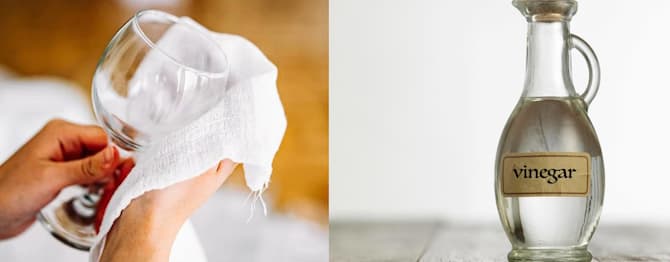
1) Polishing: Polishing is often the finishing touch that elevates your glassware from simply clean to radiant. It's particularly useful when preparing for special occasions, where you want your table settings to sparkle.
Techniques
- Glass Polishing Cloth: Specialised microfibre glass polishing cloths can provide a lint-free, streak-free shine. Gently wiping the glassware with one of these can make a world of difference.
- Vinegar Solution: A vinegar solution can work wonders for glassware that has developed cloudiness or water spots. Soak the glass in equal parts warm water and white vinegar for 15-30 minutes, then rinse and dry.
- Best For: Crystal and high-quality glassware benefit most from polishing. It restores their brilliance and helps them look their best for special occasions.
2) Dealing with Scratches: Scratches can occur from mishandling, poor storage, or even from using abrasive cleaners. They are not just cosmetic issues; they can compromise the structural integrity of the glassware.
Solutions
- Minor Scratches: Toothpaste or baking soda can be applied gently with a soft cloth in a circular motion to polish out minor surface scratches.
- Deep Scratches: These are often irreparable. Continued use of deeply scratched glassware is risky, as the structural integrity is compromised, making them more susceptible to breaking.
- Best For: Everyday glassware where minor scratches are more of a cosmetic issue. Specialty and antique glassware with deep scratches should be retired from regular use.
3) Stain Removal: Red wine, coffee, and tomato juice are some common culprits that can leave stubborn stains on your glassware.
Techniques
- Baking Soda Paste: Make a paste with baking soda and water, apply it to the stain, let it sit for a few minutes, and then gently scrub it away.
- Best For: All types of glassware can benefit from this method, but it's particularly useful for glass pitchers or decanters, which frequently come into contact with stain-inducing liquids.
Storage Solutions
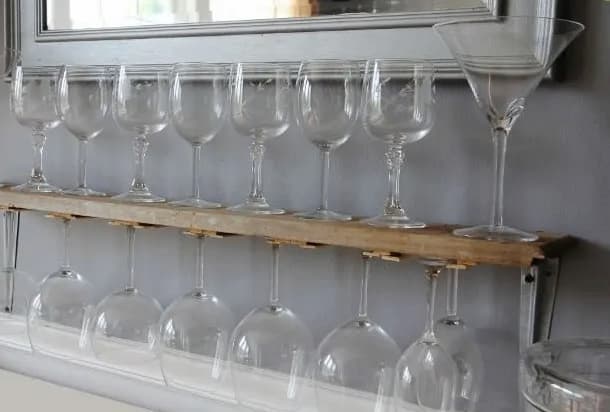
1) Upright vs. Downward: The way you store your glassware can have an impact not just on its longevity but also on its structural integrity. The rim is generally the most delicate part of a glass, which is why storing glassware upright is often considered the safest method.
- Upright Storage: This is the safest and most conventional way to store glassware. It puts less stress on the rim, reducing the likelihood of chipping or cracking.
- Downward Storage: Some wine connoisseurs recommend storing specific types of wine glasses with the rim facing downward. The argument is that this method helps maintain the shape of the glass and can prevent dust from settling in the bowl. However, this method is not universally recommended, especially for delicate or antique glassware.
- Best For: Upright storage is generally best for all kinds of glassware, from everyday use to heirloom pieces. Downward storage is more of a nuanced choice and may be suited for specific types of specialty wine glasses.
2) Spacing: Overcrowding your shelves is a recipe for disaster. Glassware needs adequate space to avoid clinking against other items, which can lead to chipping or even breaking.
- Shelf Layout: Plan your shelf layout to give each piece sufficient room.
- Padding: In tight spaces, consider using non-slip matting or small rubber separators to provide extra protection.
- Best For: All types of glassware benefit from proper spacing, but this is especially critical for fragile or antique pieces.
3) Temperature and Humidity: Storing your glassware in a cool, dry place is essential for prolonging its life and maintaining its quality.
Why It Matters
- Mildew: Warm, damp conditions can result in the growth of mildew, which is not just unsightly but also a health hazard.
- Warping: Extreme temperatures and humidity can cause the glass to warp, which can be particularly harmful to fragile or antique glassware.
- Best For: The environmental considerations apply universally, but crystal glassware, which is often more porous, can be especially susceptible to environmental damage.
By adhering to these enhanced storage guidelines, you ensure that your glassware not only remains intact but also retains its quality and appearance for years to come.
Specialised Glassware: Stemware and Crystal
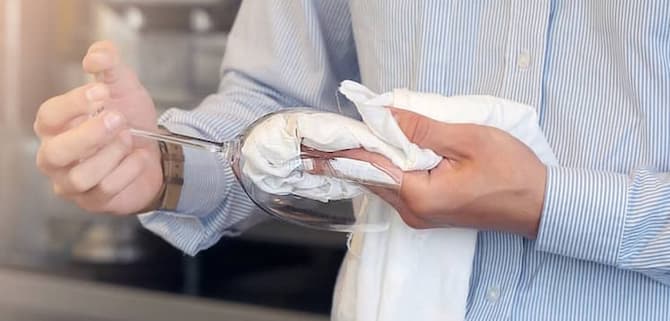
1) Stemware: This includes wine glasses, champagne flutes, and similar items, and they are notorious for being prone to breakage at the stem. This is because the stem is often the thinnest part of the glass, making it vulnerable to snapping under pressure.
Handling Tips
- Holding Technique: When washing or drying stemware, always hold it by the base, not the bowl or stem. This reduces the chance of snapping the stem.
- Cleaning Process: Using a soft sponge and mild detergent, gently clean the bowl before moving down to the stem and base.
- Best For: These handling precautions are particularly important for antique or heirloom stemware, where replacement may be difficult or impossible.
2) Crystal: Crystal glassware is made with lead oxide, which increases its brilliance but also makes it more fragile than regular glass. This added fragility necessitates special care in cleaning and maintenance.
Handling Tips
- Avoid Dishwashing: Crystal should never be washed in a dishwasher. The harsh detergents and high temperatures can etch the surface, diminishing its sparkle.
- Hand Washing: Always opt for hand washing using a mild detergent and warm, not hot, water.
- Immediate Drying: To maintain the brilliance of your crystal glassware, dry it immediately after washing using a lint-free cloth. This prevents water spots and streaking.
- Best For: These guidelines are imperative for all types of crystal glassware, be it everyday items or special pieces reserved for particular occasions.
Adhering to these specific care guidelines for stemware and crystal can prolong their lifespan while maintaining their original beauty and integrity. Specialised glassware requires specialised attention, and these tips aim to guide you in treating your valuable items with the care they deserve.
Practical Tips for Longevity

1) Thermal Shock: Rapid temperature changes can cause what is known as thermal shock, a phenomenon where the material expands and contracts quickly, leading to breakage or cracking. Glassware is particularly susceptible to this.
Avoiding Thermal Shock
- Cooling and Heating: Never move your glassware from a hot environment to a cold one, or vice versa, without allowing time for a gradual temperature adjustment.
- Proactive Measures: If you need to warm up glassware, perhaps for hot beverages, use warm tap water before pouring in the hot liquid.
- Best For: This advice is crucial for all types of glassware but is especially important for borosilicate glass items, which, although more resistant to thermal shock, are not entirely immune to it.
2) The Longevity Equation: While opting for less expensive glassware might be tempting, investing in higher-quality items can pay off in the long run. Better quality generally means better durability, and with proper care, such items will last longer, making the investment worthwhile.
What to Look For
- Material: Opt for borosilicate for items that will experience temperature changes, or crystal for items where brilliance is desired.
- Craftsmanship: Pay attention to details like even thickness and the absence of bubbles in the glass, which can indicate superior craftsmanship.
- Manufacturer's Guidelines: Always read and follow the manufacturer's guidelines for cleaning and storage. Adhering to these can extend the lifespan of your glassware.
- Best For: This principle applies to all kinds of glassware but is especially relevant for stemware and crystal, where higher quality often translates to a longer lifespan and a better experience when using the items.
By taking a conscientious approach to the temperature changes your glassware experiences and investing in high-quality items, you are doing your part to ensure that your collection remains in top-notch condition for years.
Conclusion
Proper maintenance of your glassware extends its lifespan and enhances your overall dining experience. From the basics of cleaning to the nuances of storage, a little bit of knowledge and care can go a long way. Whether you're a homeowner wanting to preserve your kitchenware or a restaurateur aiming to maintain a luxurious dining experience, these expert tips will serve you well.
The Glassware Only Team



